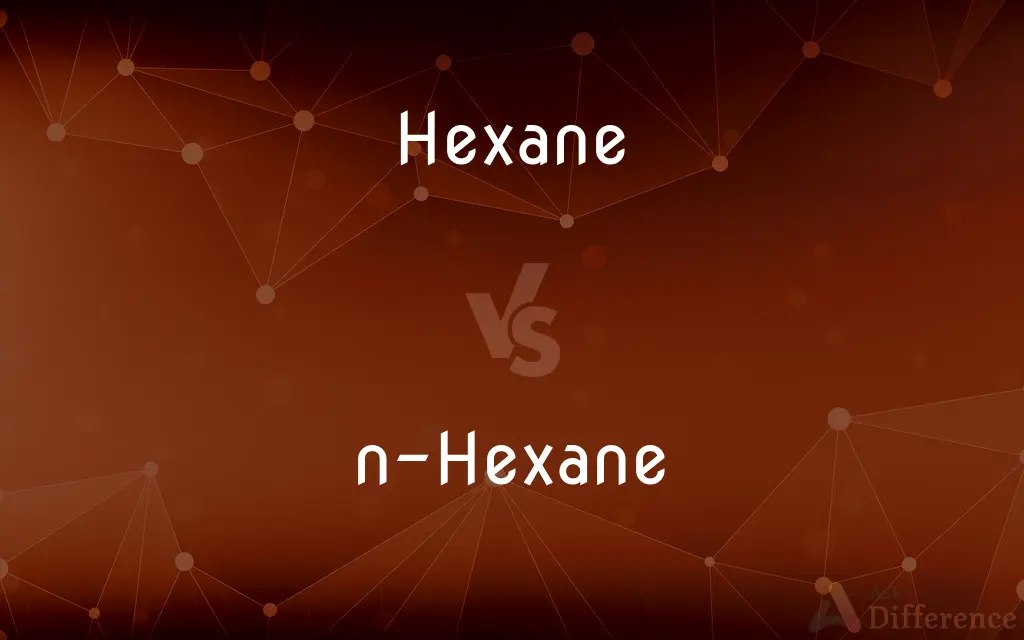Hexane vs. n-Hexane — What's the Difference?
By Tayyaba Rehman — Published on December 21, 2023
Hexane refers to a group of isomeric alkanes, while n-Hexane is the straight-chain isomer of hexane with six carbon atoms.

Difference Between Hexane and n-Hexane
Table of Contents
ADVERTISEMENT
Key Differences
Hexane and n-Hexane are both hydrocarbons, with Hexane referring to a group of isomeric alkanes. On the other hand, n-Hexane is specifically the linear or straight-chain isomer of hexane, composed of six carbon atoms in a row.
In industrial applications and organic chemistry, the term "Hexane" often encompasses several isomers, including n-Hexane but also other structural variations. In contrast, n-Hexane denotes a very specific structure with no branches in its carbon chain.
The physical and chemical properties of Hexane can vary slightly depending on its isomeric composition. However, n-Hexane, being a specific isomer, exhibits consistent and well-documented properties.
Toxicologically, n-Hexane is of particular concern, as it's known to have neurotoxic effects, especially with prolonged exposure. While Hexane, in general, is also hazardous, the specific health effects can depend on the isomeric mixture.
In summary, while Hexane generally refers to a group of chemical isomers, n-Hexane points to a distinct, straight-chained structure of this group, leading to specific properties and effects.
ADVERTISEMENT
Comparison Chart
Definition
Group of isomeric alkanes
Straight-chain isomer of hexane
Structural Variation
Can have multiple structures
Has a specific linear structure
Physical Properties
Varies based on isomeric composition
Consistent and specific
Toxicological Concern
Varies based on specific isomers
Known for neurotoxic effects
Chemical Formula
C6H14
C6H14
Compare with Definitions
Hexane
A group of isomeric hydrocarbons.
Industrial processes often use various isomers of Hexane.
n-Hexane
Specific isomer of Hexane.
N-Hexane's linear structure distinguishes it from other hexane isomers.
Hexane
Commonly used as a solvent.
Hexane's ability to dissolve oils makes it valuable in labs.
n-Hexane
Used in industrial extraction processes.
N-Hexane effectively extracts vegetable oils in industries.
Hexane
A volatile organic compound.
Due to its volatility, Hexane can contribute to air pollution.
n-Hexane
Known for its neurotoxic effects.
Prolonged exposure to n-Hexane can lead to neurological issues.
Hexane
Constituent in gasoline.
Hexane is one of the many hydrocarbons found in gasoline.
n-Hexane
A straight-chain hydrocarbon with six carbon atoms.
N-Hexane is often differentiated from its branched isomers.
Hexane
Has multiple structural variations.
Hexane's properties can differ depending on its structural isomers.
n-Hexane
Has a consistent set of properties.
Unlike mixed hexane, n-Hexane's properties are well-defined and consistent.
Hexane
Any of several isomeric colorless flammable liquid hydrocarbons, C6H14, derived from the fractional distillation of petroleum and used as a solvent and as a working fluid in low-temperature thermometers.
n-Hexane
(organic compound) The saturated aliphatic hydrocarbon (CH3(CH2)4CH3).
Hexane
(organic compound) Any of five isomeric aliphatic hydrocarbons, C6H14. They are colorless, volatile liquids.
Hexane
Any one of five hydrocarbons, C6H14, of the paraffin series. They are colorless, volatile liquids, and are so called because the molecule has six carbon atoms.
Hexane
A colorless flammable liquid alkane derived from petroleum and used as a solvent
Common Curiosities
Are Hexane and n-Hexane used as solvents?
Yes, both Hexane and n-Hexane are used as solvents in various applications.
How does n-Hexane differ from Hexane?
n-Hexane is a specific straight-chain isomer, while Hexane includes multiple isomers.
What is Hexane?
Hexane is a group of isomeric hydrocarbons with the formula C6H14.
Is n-Hexane a type of Hexane?
Yes, n-Hexane is one of the isomers that fall under the category of Hexane.
Is Hexane flammable?
Yes, both Hexane and n-Hexane are highly flammable.
Are Hexane and n-Hexane naturally occurring?
Both Hexane and n-Hexane can be found in natural sources like petroleum.
Why is n-Hexane used in vegetable oil extraction?
n-Hexane is efficient in extracting vegetable oils due to its solvency properties.
Which is more toxic, Hexane or n-Hexane?
n-Hexane is specifically known for its neurotoxic effects, but all hexane isomers can be hazardous.
How many isomers does Hexane have?
Hexane has several structural isomers, including n-Hexane, 2-methylpentane, and 3-methylpentane.
Does n-Hexane have a branched structure?
No, n-Hexane has a straight-chain structure.
Can I use the terms Hexane and n-Hexane interchangeably?
No, Hexane refers to multiple isomers, whereas n-Hexane refers to a specific straight-chain isomer.
Are Hexane and n-Hexane the same in terms of molecular formula?
Yes, both Hexane and n-Hexane have the molecular formula C6H14, but they differ in structural arrangement.
Can exposure to n-Hexane lead to health issues?
Yes, prolonged exposure to n-Hexane can cause neurotoxic effects.
Is Hexane a singular compound?
No, Hexane refers to a group of isomeric compounds, while n-Hexane is one specific compound within that group.
Which has a more defined set of properties, Hexane or n-Hexane?
n-Hexane has a more consistent and defined set of properties compared to the general term "Hexane" which encompasses multiple isomers.
Share Your Discovery

Previous Comparison
Cortical Nephron vs. Juxtamedullary Nephron
Next Comparison
Rechargeable Batteries vs. Non Rechargeable BatteriesAuthor Spotlight
Written by
Tayyaba RehmanTayyaba Rehman is a distinguished writer, currently serving as a primary contributor to askdifference.com. As a researcher in semantics and etymology, Tayyaba's passion for the complexity of languages and their distinctions has found a perfect home on the platform. Tayyaba delves into the intricacies of language, distinguishing between commonly confused words and phrases, thereby providing clarity for readers worldwide.
















































